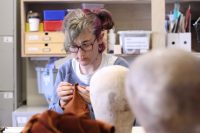
The School is committed to selecting, training and supporting students, regardless of ethnicity, gender, disability, age, sexual orientation or religion. Applicants are chosen solely on the basis of their talent and potential to develop the skills required for their chosen profession. The School does, however, judge applicants on their suitability for a course and their potential to successfully complete the training, as the work is rigorous and requires high levels of energy and commitment.
Student Support on the programmes at the School covers a variety of areas such as support for disabled students, academic support, student finance and health and welfare. Julia Heeley, Student Support Manager, is able to answer queries about support available for disabled applicants/students. Her email address is [email protected] and she can also be reached by telephone on 0117 980 9247.
Our Academic and Student Support services team provides help in the following areas:
Support for students with disabilities including specific learning difficulties
In our admissions process, we are committed to supporting students with disabilities. Disabled students are encouraged to disclose their support requirements so that we can endeavour to meet them during the audition or interview process and subsequent training. The School welcomes all students regardless of disability. It is our aim to provide appropriate support so that all students are able to achieve their full potential.
Students with a disability will be provided with advice and support from the Student Support Manager. If you have a disability or specific learning difficulty we recommend you contact her either prior to starting your course or during your first few weeks at the School to discuss any support requirements you may have. This may include support resulting from disabilities such as sensory impairment, learning difficulties such as dyslexia or dyspraxia or mental health difficulties.
We recognise that everyone is an individual and we will work with students to identify potential barriers to training and do what we can to remove those barriers. We will also make any necessary reasonable adjustments, to ensure that disabled students can train at the School.
Quickscan screening
We are aware that nationally there is a very high proportion of students with Specific Learning Difficulties (SpLDs) e.g. dyslexia or dyspraxia, in institutions which specialise in art, design or the performing arts. During your first week, the School encourages all students to take a short questionnaire known as QuickScan. It takes the form of an on-line, easy to navigate, questionnaire which will help to identify your learning style and specific areas of learning strengths and weaknesses. It is used in conjunction with other indicators, including student disclosure (as part of the interview and registration process), tutor feedback on practical and written work, and students expressing their concerns and any support requirements which may become apparent during their studies.
Disabled Student Allowance (DSA)
UK students with disabilities (including Specific Learning Difficulties and long-term Mental Health conditions) can apply for the Disabled Students Allowance (DSA). DSA usually provides support for students with the specialist equipment and tools necessary to support you with your studies, including software, hardware and study skills support. Unlike a student loan, DSA does not have to be repaid. However, it is rarely awarded in the form of financial support.
Applications are made through Student Finance England (SFE), Student Finance Wales (SFW), or Student Awards Agency for Scotland (SAAS). In order to apply for DSA, Student Finance will require evidence of any impairment or disability. This may take the form of a doctor’s or specialist’s letter or, more often, a report from an Educational Psychologist (Diagnostic Assessment Report).
If you require a Diagnostic Assessment from an Educational Psychologist, the Student Support Manager can arrange this for you and can guide you through the process.
Personal Academic Support
Various staff members at the School can help in different ways if you need academic support. If you need help with the content of classes or assessment work, you can ask the relevant head of course, tutor or your pastoral care tutor for an appointment or you can ask the Student Support Manager to arrange a tutorial with the relevant member of staff on your behalf. If you make an appointment, you can prepare for the meeting and discuss your concerns away from class. Heads of courses, modules leaders and individual tutors can all help you with understanding aspects of your training and can offer overall guidance or advice about your programme of study.
Study skills (including reading, note-taking and presentation skills)
Study skills support is usually arranged for students who have been awarded support through Disabled Student Allowance (DSA). However, the Student Support Manager will be happy to arrange one to one study skills support for you if deemed appropriate and necessary.
Mental Health, wellbeing and counselling
BOVTS recognises the challenges faced by students entering higher education and that training in a conservatoire institution can place great demands on a student both physically and emotionally.
The School has a student therapy and counselling service, which is organised and staffed by accredited, registered psychotherapists and counsellors and is there to help with any more deep-seated personal problems on which pastoral tutors are not qualified to advise. If students wish to have an initial assessment with a therapist or counsellor, they should contact the School’s Student Support Manager. A strict professional code of confidentiality is always maintained.
Student welfare and pastoral care
We actively encourage students to develop a pro-active and positive approach to their own ‘wellness’. We are preparing professionals to enter physically and mentally challenging professions and we work to enable students to sustain a physically and mentally healthy lifestyle.
Every student is assigned a pastoral tutor who monitors their progress throughout the year in addition to having access to the Student Support Manager. All students have tutorials with their head of course, head of year or allocated pastoral care tutor in which non-teaching issues can be discussed. A confidential tutorial can be requested of any member of the full-time teaching staff on your course.
In addition, BOVTS students have access to UWE’s Student Wellbeing Service, details of which can be found on UWE Bristol’s website.
For further information on support which the School offers, please see the Guide to Student Support.




